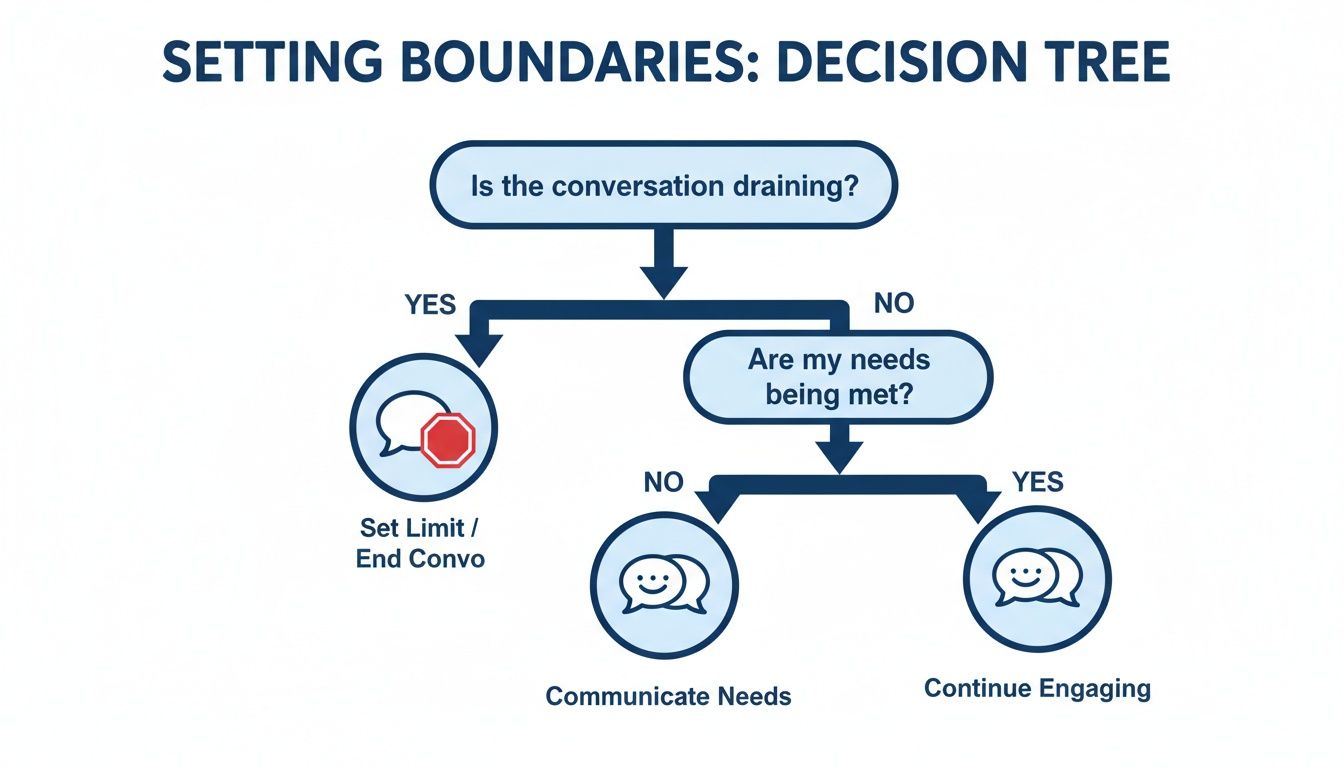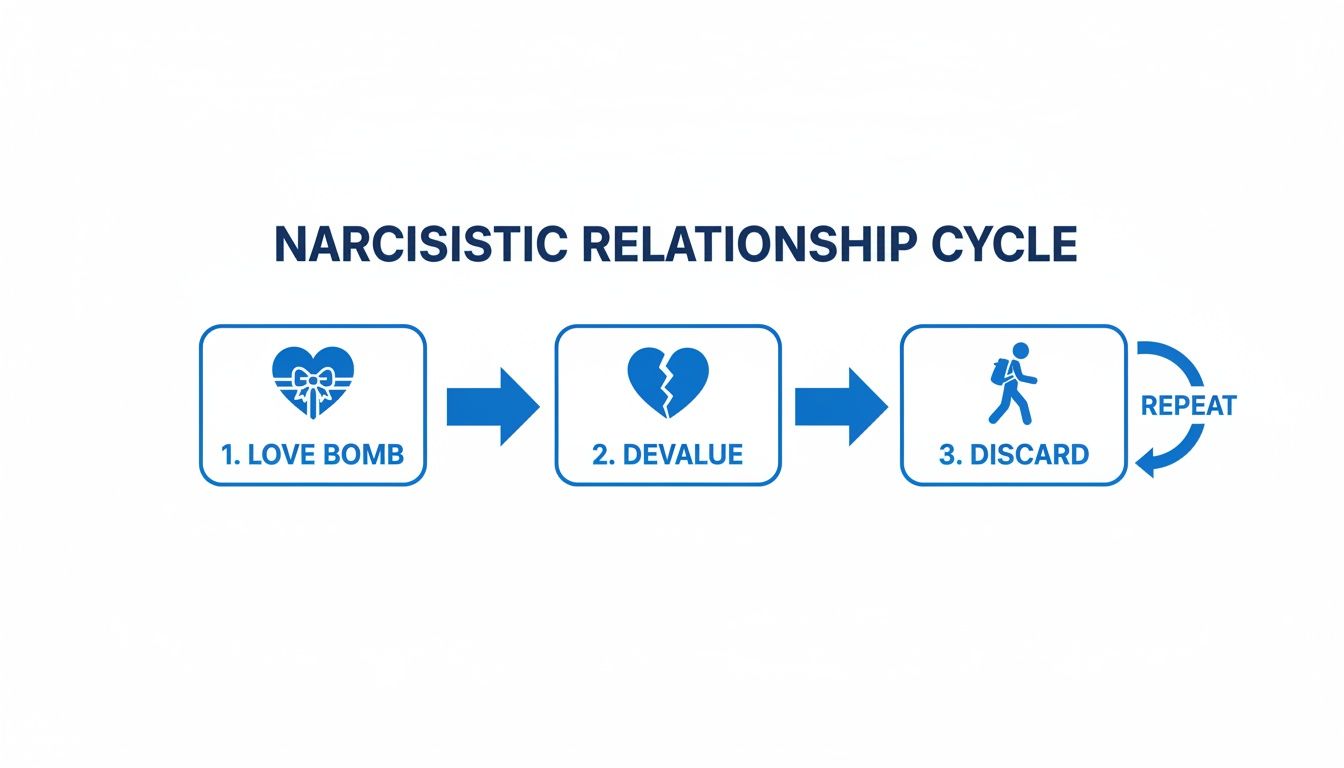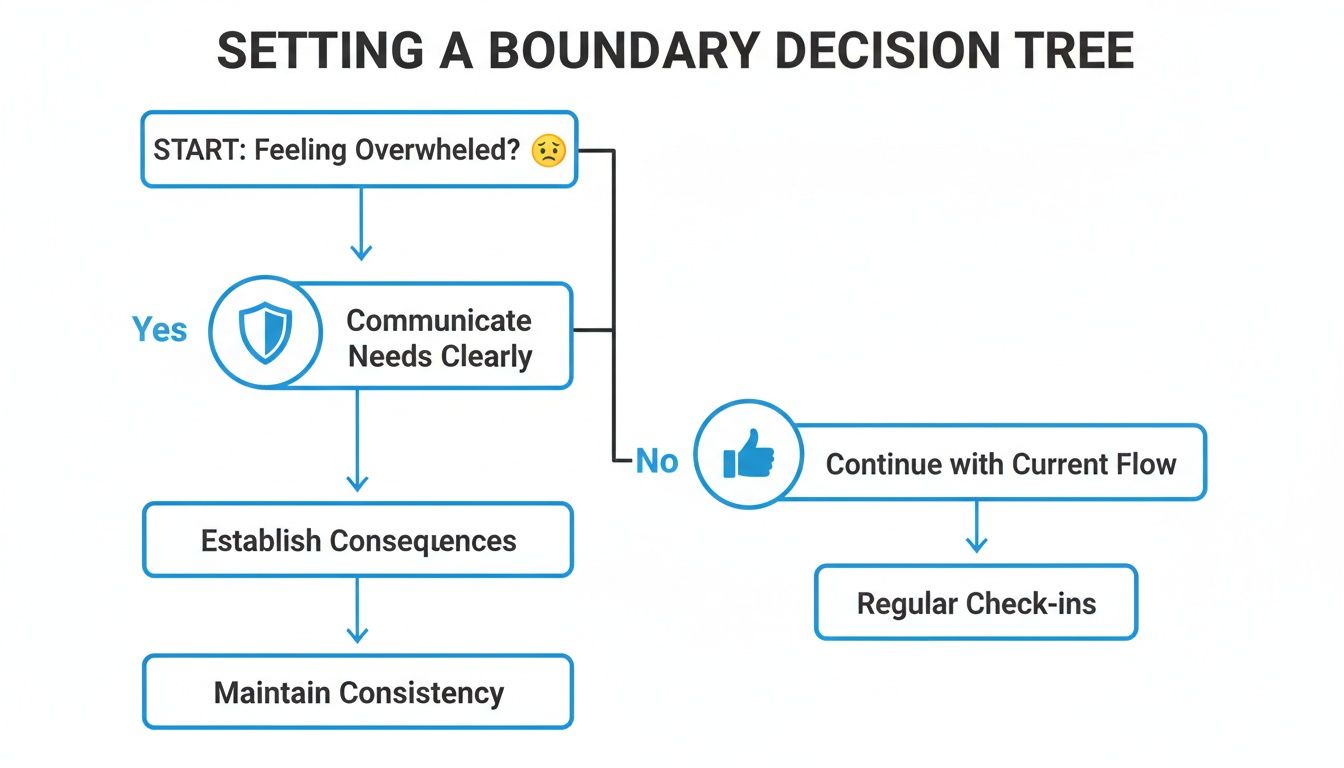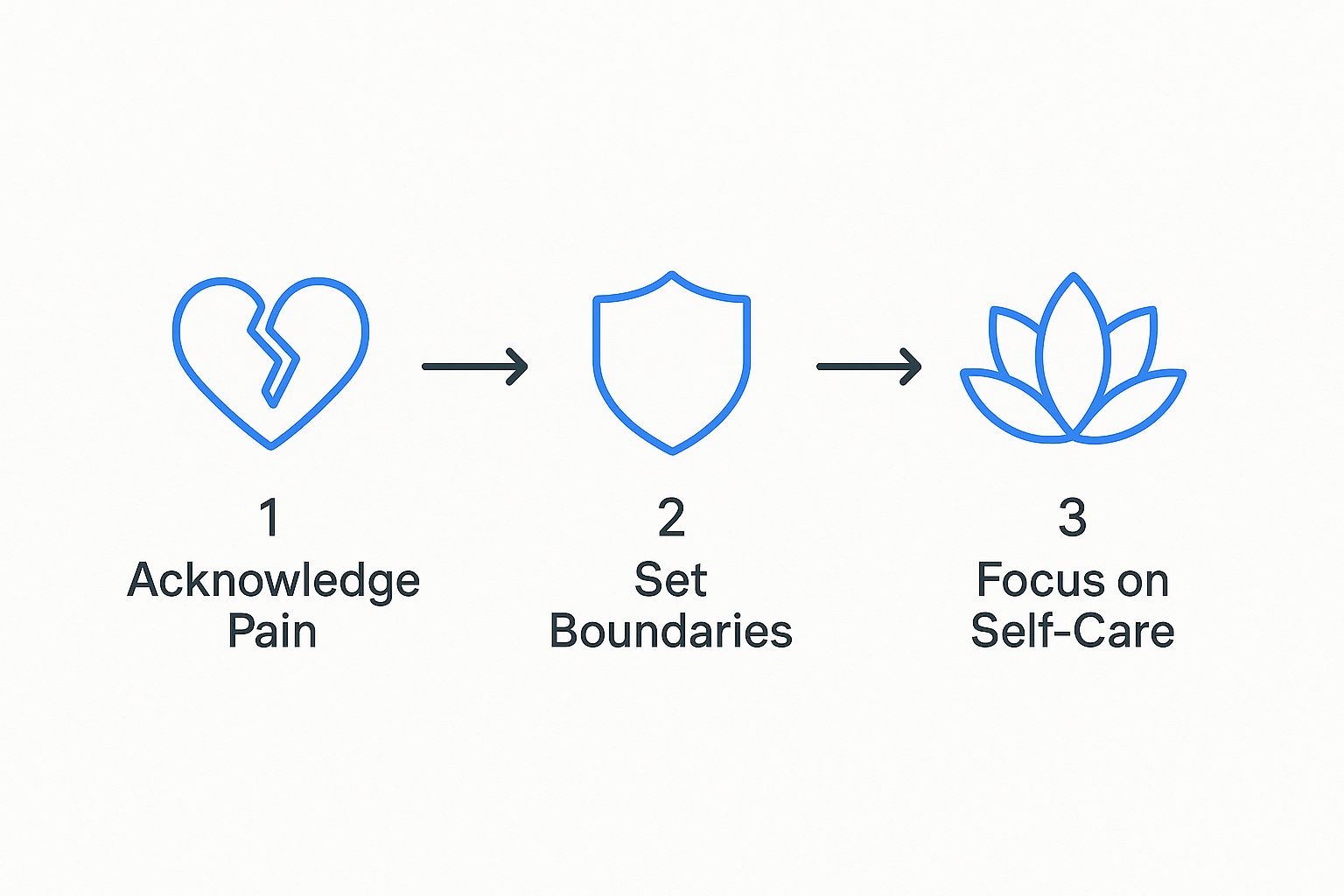Navigating friendships that leave you feeling more drained than uplifted is a common challenge. Learning how to deal with negative friends involves setting boundaries to protect your emotional energy. This guide offers supportive steps to understand the impact of these relationships and foster your own well-being.
The Hidden Toll of Negative Friendships on Your Well-Being

A friend should be a source of support, but sometimes you may walk away from your time together feeling exhausted or anxious. If this sounds familiar, you're not alone. These kinds of friendships can subtly affect your mental peace and overall happiness over time.
Recognising this pattern is the first step toward reclaiming your energy. Understanding how these dynamics can lead to stress or burnout empowers you to protect your well-being and build emotional resilience.
Understanding the Emotional Cost
Friendships should add joy to our lives, but some connections can become a source of ongoing stress. This often happens when interactions are consistently one-sided or pessimistic. Over time, exposure to such negativity can affect your self-esteem and outlook on life.
Perhaps you've shared good news, only to be met with a cynical comment that deflates your joy. Or maybe conversations always revolve around their problems, with no space for your experiences. This constant emotional work is draining and can lead to resentment.
In India, the connection between social circles and mental health is significant, highlighting a globally relatable issue. Studies show that negative peer groups can increase feelings of anxiety. You can explore the broader context of mental health trends in India30475-4/fulltext) to see how our relationships and well-being are linked.
Recognising the Signs of a Draining Friendship
Identifying the specific behaviours that drain you is an important step. This isn’t about labelling someone as a "bad friend" but observing the dynamic and how it makes you feel. Think of this as an informational assessment for your own well-being, not a diagnostic judgment.
Comparing what you feel with a healthy, supportive connection can bring clarity.
Spotting the Difference Between Supportive and Draining Friendships
This table helps you quickly identify the emotional impact of different friendship dynamics, clarifying whether a connection is nurturing or draining your energy.
| Behavior Pattern | How It Feels in a Negative Friendship | What a Supportive Friendship Looks Like |
|---|---|---|
| Sharing News | You hesitate to share good news, fearing jealousy or dismissal. | You're excited to share because you know they'll celebrate with you. |
| Conversations | The talk is dominated by their complaints and problems. You feel like a sounding board. | There's a mutual exchange. You both get to share, listen, and feel heard. |
| Emotional State | You feel mentally and emotionally exhausted after spending time with them. | You feel energised, understood, and uplifted after you hang out. |
| Your Problems | Your challenges are minimised, ignored, or turned into a competition. | They listen with empathy and offer genuine support, even if it's just an ear. |
| Boundaries | They consistently overstep your boundaries and dismiss your needs. | They respect your limits and understand when you need space. |
Seeing these differences can validate your feelings and provide a starting point for change.
Here are a few more specific signs that a friendship may be taking a negative toll:
- You feel emotionally exhausted after spending time with them. Instead of feeling recharged, you feel depleted, like your energy has been siphoned off.
- Conversations are dominated by their negativity. They might complain endlessly, focus on problems, or dismiss any positive perspective you offer.
- You hesitate to share your own successes or joys. You hold back good news because you anticipate a critical or dismissive response.
- You feel unheard or unappreciated. Your thoughts, feelings, and experiences are regularly overlooked or made to feel small.
Acknowledging these patterns is an act of self-compassion. It means you are tuning into your emotional needs and recognising that your well-being matters. This is the foundation for building healthier, more supportive relationships.
Learning how to handle negative friends is a skill that strengthens your emotional resilience. It gives you the power to manage difficult interactions, whether navigating workplace stress or personal relationships. Professional guidance through therapy or counselling can also provide valuable tools for this journey.
Getting to Grips with Different Patterns of Negative Behaviour

Before you can decide how to handle a draining friendship, it helps to pinpoint what is causing the issue. This is about observing behaviours calmly, not applying unhelpful labels.
When you see these dynamics as patterns, the goal shifts from blame to understanding. This assessment is informational, not diagnostic, and serves as a tool to protect your own well-being.
The Constant Complainer
We all need to vent sometimes, but for some friends, complaining is their main way of communicating. The Constant Complainer often focuses on what's wrong, and their pessimism can be contagious. You might walk away from conversations feeling heavy and exhausted.
For example, you might be excited about a new project, only for them to respond with a comment about workplace stress. This can deflate your positivity and pull the conversation back into a negative cycle.
The Crisis Magnet
Some friends seem to move from one drama to the next, expecting you to be their constant support. The Crisis Magnet often operates with an intensity that demands your immediate attention. While you want to be there for a friend, it becomes exhausting when crises are constant.
Your evenings might be interrupted by calls over minor issues, which can fuel your own anxiety. This constant state of alert leaves little room for a calm, balanced friendship.
The Subtle Critic
This pattern can be tricky because the negativity is often disguised as a "joke" or "helpful" advice. The Subtle Critic makes small, cutting remarks about your choices or dreams. These comments can wear away at your self-esteem over time.
For instance, if you share a new goal, they might say, “Are you sure you can stick with that?” While it may sound like concern, the underlying message is one of doubt. This can impact your mental health and contribute to feelings of depression.
Understanding these patterns isn't about boxing someone in. It's about naming the behaviours that drain your energy, which helps you choose the right strategy for your situation.
The Competitive Friend
With this friend, life can feel more like a competition than a shared journey. The Competitive Friend might subtly one-up your stories or downplay your achievements. This dynamic makes it difficult to celebrate your wins without them trying to top you.
Imagine sharing photos from a nice holiday, and they immediately start talking about their own more "exotic" trip. This constant competition creates a tense atmosphere where you can never fully relax.
Learning how to deal with negative friends starts with recognising these patterns. By identifying the root behaviour, you can protect your own peace of mind.
Building this awareness is a great boost for your emotional resilience. Once you see the pattern, you are less likely to take the negativity personally. This allows you to make conscious choices about how you engage, improving your overall well-being with support from counselling or therapy if needed.
Practical Ways to Start Setting Healthy Boundaries
Setting boundaries is a powerful act of self-respect that protects your emotional energy for the people and things that matter. Here, we'll explore kind but firm ways to manage draining interactions. These strategies can help reduce personal anxiety and manage workplace stress.
The goal is not to create conflict but to create the mental space you need to thrive.
Start Small, Stay Consistent
You don’t need a dramatic confrontation to set a boundary. The most effective way is to start with small, consistent actions that gently redraw the friendship's lines. This approach is less intimidating for everyone involved.
A simple first step is to limit the time you spend together. If long hangouts become negative, suggest a quick coffee instead. This allows you to connect without getting stuck in a negativity loop.
Another gentle tactic is to redirect the conversation when it turns negative.
- Limit your availability: It's okay not to be on call. Try saying, "I only have about 15 minutes before my next task, but I'd love to catch up quickly!"
- Redirect the spiral: If a friend is complaining, you could say, "That sounds really tough. On a different note, did you see that movie we talked about?" This acknowledges their feelings but shifts the focus.
- Bring in reinforcements: Suggest meeting in a larger group. The presence of others can naturally dilute the intensity of a one-on-one conversation.
Lead with Empathy, Follow with a Boundary
This powerful technique involves acknowledging your friend's feelings before stating your own need or limit. It shows you are listening and you care. This is a way of saying, "I hear you, and this is what I need."
This approach helps prevent the other person from becoming defensive. You are being honest about what you can offer in that moment. It's a compassionate way to protect your mental health.
"I can hear how frustrated you are, and I'm sorry you're going through that. Right now, I don't have the emotional space to talk about stressful topics. Could we chat about something else?"
This script is both honest and kind, communicating care and a clear limit. This is crucial for building your resilience. For more on this, explore this guide on practicing boundaries in conversations.
Use "I" Statements to Own Your Needs
When communicating a boundary, your choice of words matters. Using "I" statements focuses on your feelings and needs, which is less likely to be seen as an attack. It turns a potential confrontation into a conversation.
Instead of an accusatory "You're always so negative," try framing it from your perspective.
Here are a few examples:
- "I feel a bit overwhelmed when our chats focus a lot on problems."
- "I need our time together to feel more balanced for my own well-being."
- "I find it hard to be supportive when I'm feeling drained myself."
This is a cornerstone of healthy communication that can lower stress. Empathetic yet firm responses can have a positive impact on your well-being.
Be Prepared for How They Might React
When you start setting boundaries with someone used to you having none, they may not react positively. Be prepared for some resistance, confusion, or even frustration. It is a natural response to a change in the dynamic.
Your role is to stay calm and hold your ground without needing to over-explain or apologize. A simple, firm, and consistent response is your best tool.
If they push back, you could say, "I understand this feels different, but it's what I need for my own well-being right now." Consistency reinforces the new boundary and validates your needs. This is vital for managing anxiety and preventing feelings of depression, and therapy or counselling can offer a space to practice these skills.
Navigating the Decision to End a Friendship
Choosing to end a friendship is one of the toughest decisions you can make. It's often a last resort after you've tried setting boundaries and communicating your needs, but nothing has changed. This isn’t giving up; it’s a powerful act of self-care and a recognition that your mental well-being is a priority.
If you consistently feel drained, anxious, or small after seeing a friend, it’s fair to question if the relationship is healthy for you. When your boundaries are repeatedly ignored, it's a sign that the dynamic is unlikely to change on its own.
Knowing When It’s Time to Let Go
There's no magic formula, but some signs are clear. Do you feel dread before seeing them? Do you walk on eggshells during conversations? Does your self-esteem drop after you spend time together? These indicate the friendship may be more harmful than helpful, and building resilience is more important than enduring a draining connection.
This visual decision tree can help you map out your feelings and decide on the next steps when a conversation starts to drain you.

Your emotional response—whether you feel drained or energized—is a valid signal. Trust it when deciding whether to set a new boundary or create distance.
Different Approaches for Different Friendships
How you end a friendship depends on the relationship. Not every parting requires a dramatic conversation.
- The Gradual Fade-Out: For casual friendships, slowly pulling back can be the kindest and least confrontational path. This might mean taking longer to reply to messages and politely declining more invitations.
- The Direct Conversation: With close, long-term friends, a direct but gentle conversation is often the most respectful approach. It honours your history while being clear about your need to step away.
It's okay to outgrow friendships. Acknowledge the good times you shared, but don't let guilt keep you in a dynamic that harms your mental health and contributes to feelings of anxiety or depression. Your peace is a priority.
Gentle Scripts for a Difficult Talk
If you choose a direct conversation, focus on your feelings using "I" statements rather than placing blame. The goal is to be clear and compassionate, not to start an argument.
Here are a few ways you could phrase it:
- "I’ve been thinking a lot about my own well-being lately, and I’ve realised that our friendship dynamic isn't healthy for me right now. I need to take a step back."
- "I value the friendship we’ve had, but I feel we’ve grown in different directions. For my own mental health, I need to create some space."
- "I feel that our conversations often leave me feeling drained, and I need to focus my energy on more balanced and supportive relationships."
It's also worth considering your online presence. Learning how to strategically remove friends for improved well-being can be an important part of protecting your energy in the digital world.
Ending a friendship is a loss, and it's normal to feel sad or guilty. Be kind to yourself, lean on supportive friends, and consider talking to a counselling professional if the feelings are overwhelming. This is a brave move toward a happier, healthier life.
Cultivating Positive Connections and Rebuilding Your Circle

Letting go of a draining friendship creates space for healthier, more uplifting connections. Think of this as a new beginning focused on nurturing your social well-being. It's an opportunity to intentionally build a support system that truly enriches your life.
This process is a crucial part of building resilience. It involves consciously choosing who gets your time and energy. By focusing on quality over quantity, you can create a social circle that champions your personal growth and happiness.
What Makes a Friendship Healthy
Before building new connections, it helps to be clear on what you're looking for. A healthy friendship is built on mutual respect, where both people feel seen and valued. It’s a two-way street where support flows in both directions.
These relationships have a few key ingredients:
- Shared Joy: You celebrate each other's successes without envy. Their wins feel like yours, and vice versa.
- Genuine Support: During tough times, you can count on them for empathy and a listening ear, not judgment.
- Mutual Respect: You honour each other's boundaries, opinions, and life choices, even when they differ.
- Trust and Safety: You feel safe to be your authentic self, knowing you can be vulnerable without fear.
When friendships have these qualities, they become a buffer against life’s challenges, from workplace stress to feelings of anxiety or depression. These are the connections that refuel your spirit.
Reconnecting with Old Friends and Finding New Ones
Rebuilding your social circle doesn’t have to mean starting from scratch. You can start by rekindling positive connections that may have faded over time. A simple message is all it takes to reach out to a friend who always made you feel good.
At the same time, stay open to forming new bonds. Joining a class or community group around your interests is a great way to meet like-minded people. In India, for example, joining a local book club or a volunteer organisation can introduce you to people who share your passions.
Investing in positive relationships is an act of self-care. It's about surrounding yourself with people who reflect the person you are and want to become, fostering a genuine sense of belonging and well-being.
This isn’t about rushing to fill a void. It's about mindfully curating a community that aligns with who you are.
The Power of Positive Psychology in Friendships
Positive psychology offers valuable insights into creating a thriving social life. It encourages us to focus on strengths like compassion, gratitude, and optimism. Applying these principles to your friendships can deepen connections and boost your own happiness.
A simple practice is to express gratitude, like sending a quick text to a friend to say their chat lifted your spirits. Another is to be a "positive responder" by reacting with genuine enthusiasm to a friend's good news. This amplifies their joy and reinforces your supportive bond.
These actions help build social capital—the supportive network of relationships that contributes to better mental health.
Ultimately, learning how to deal with negative friends leads to self-discovery. It teaches you to value your emotional health and empowers you to build authentic connections. If this process feels challenging, seeking guidance through therapy or counselling can provide invaluable support on your journey to a resilient and joyful life.
Your Questions, Answered
Navigating a difficult friendship can bring up confusing feelings. It’s normal to feel unsure about what to do next. Let's walk through some common questions about handling friendships that have become challenging.
This is supportive guidance, not a substitute for professional advice. If you feel stuck, reaching out for therapy or counselling is a sign of strength.
Am I a Bad Person for Distancing Myself from a Negative Friend?
Not at all. Stepping back to protect your mental well-being is an act of self-care. Healthy friendships should be reciprocal; they should lift you up, not consistently pull you down.
When a friendship leaves you feeling drained or anxious, creating distance is a healthy response. It's about protecting your energy so you can be present in your own life. Taking care of yourself allows you to be a good friend to others and, most importantly, to yourself.
What If My Negative Friend Has Depression or Is Going Through a Tough Time?
This is a compassionate question and a very difficult situation. The key is to find the balance between supporting a friend and protecting your own mental health. You can offer a listening ear and encourage them to seek professional help.
At the same time, you must protect your own emotional reserves. It's okay to set a boundary by saying something like, "I care about you and I'm sorry you're going through this, but I don't have the emotional capacity to give you the full support you need. Have you considered talking to a counselling professional?" Supporting a friend should never come at the cost of your own mental health, especially if it's contributing to your own feelings of anxiety or depression.
How Do I Handle a Negative Friend I Cannot Avoid?
This is a common challenge with colleagues experiencing workplace stress or even certain family members. When physical distance isn't possible, the goal is to create emotional distance. This is where firm and consistent boundaries are essential.
Keep interactions brief, polite, and focused on necessary topics. Make a conscious effort not to get drawn into their complaints or drama.
An effective technique for this is 'grey rocking,' which involves making yourself as uninteresting as a plain grey rock.
- Keep your answers short and non-committal. Use simple replies like "I see," or "Okay."
- Don't overshare. The less personal information you give, the less they have to comment on.
- Stick to neutral ground. Talk about impersonal topics like the weather or a work project.
This approach makes you a less satisfying target for negativity and helps conserve your emotional energy. It can also help to interact with them in group settings to diffuse the intensity.
Learning to hold your emotional boundaries is a powerful skill for building resilience. It reminds you that you can stay calm and centred, no matter what someone else is doing. You are not responsible for managing their emotions.
When Should I Consider Therapy for a Friendship Issue?
Reaching out for professional support is a smart move if a friendship is causing you serious distress. It might be time to consider therapy if a relationship is triggering your anxiety, harming your self-esteem, or leaving you feeling completely overwhelmed.
A therapist can help if you feel guilty about setting boundaries or notice a pattern of draining friendships. Professional counselling provides a safe space to work on communication, build emotional resilience, and learn how to foster healthier, more fulfilling connections.
If you're looking for guidance on how to build healthier relationships and improve your overall well-being, DeTalks is here to help. Our platform connects you with qualified therapists and provides scientifically validated assessments to give you deeper insights into your mental health. Take the first step towards a more balanced and fulfilling life by exploring our resources at https://detalks.com.
















